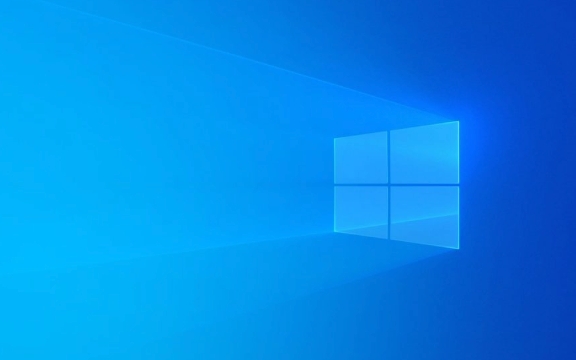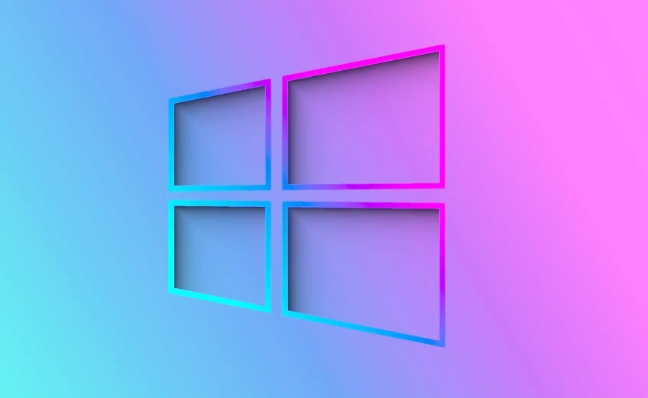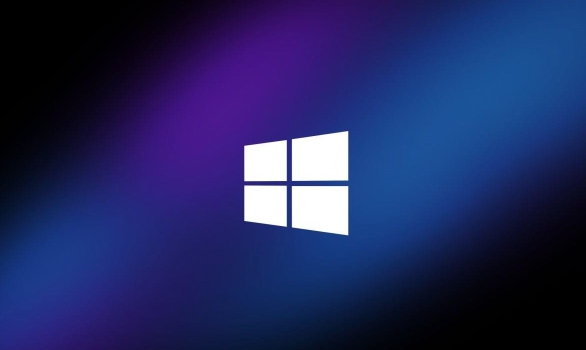How to fix a 'limited connectivity' Wi-Fi error in Windows
Aug 02, 2025 pm 02:55 PMFirst run the network troubleshooter, 1. Run the network troubleshooter to automatically fix common problems, 2. Restart the router and computer to clear temporary failures, 3. Retrieve the IP address through the administrator command prompt, 4. Execute the netsh winsock reset, netsh int ip reset and ipconfig /flushdns commands to reset the network stack and clear the DNS cache, 5. Check IP address conflicts and consider setting static IP or adjusting the router DHCP settings, 6. Update or reinstall Wi-Fi drivers in Device Manager, 7. You can choose to disable IPv6 to eliminate protocol interference, 8. Log in to the router management interface to check whether DHCP is enabled and MAC filtering and other settings. In most cases, the above steps can be used to quickly restore the Internet connection, and the problem is usually solved.

If your Windows PC shows a “l(fā)imited connectivity” Wi-Fi error, it means your device is connected to the router but can't get proper internet access—usually because it failed to obtain a valid IP address. This is a common networking issue, but it's usually fixed with a few straightforward steps.

Here's how to troubleshoot and fix limited connectivity on Windows:
1. Run the Network Troubleshooter
Windows includes a built-in tool that can detect and fix common network problems.

- Right-click the Wi-Fi icon in the system tray.
- Select "Troubleshoot problems" .
- Let Windows scan and apply automatic fixes (like resetting adapters or renewing IP).
This often resolves the issue immediately, especially if it's a temporary glitch.
2. Restart Your Router and Computer
Many connectivity issues stem from temporary router or modem malfunctions.

- Turn off your router and modem.
- Wait 30 seconds, then power them back on.
- Restart your Windows PC after the router is fully online.
This clears temporary network hiccups and forces a fresh connection.
3. Renew Your IP Address
“Limited connectivity” often happens when Windows fails to get an IP address from the router via DHCP.
Open Command Prompt as administrator:
- Press Win X , then choose Command Prompt (Admin) or Windows Terminal (Admin) .
- Run these commands one at a time:
ipconfig /release ipconfig /renew
If the ipconfig /renew command fails or give an APIPA address (like 169.254.xx), the issue is likely with the router's DHCP or your connection to it.
4. Flush DNS and Reset Network Stack
Corrupted network settings or DNS cache can interfere.
In the same admin Command Prompt, run:
netsh winsock reset netsh int ip reset ipconfig /flushdns
Then restart your computer . This resets network components to default settings and clears stale configurations.
5. Check for IP Address Conflicts
If another device on the network has the same IP, conflicts can cause limited connectivity.
- Try setting a static IP temporarily (but outside the router's DHCP range).
- Or ensure your router reserves IPs properly via DHCP.
But in most cases, simply rebooting the router and PC resolves conflicts.
6. Update or Reinstall Wi-Fi Driver
Outdated or corrupted drivers can cause connection issues.
- Press Win X > Device Manager .
- Expand Network adapters .
- Right-click your Wi-Fi adapter > Update driver .
- Choose “Search automatically for updated driver software.”
If that doesn't help, try:
- Right-clicking the adapter > Uninstall device .
- Then restart your PC—Windows will reinstall the driver automatically.
7. Disable IPv6 (Optional)
Sometimes IPv6 misconfiguration can interfere.
- Go to Control Panel > Network and Sharing Center > Change adapter settings .
- Right-click your Wi-Fi connection > Properties .
- Uncheck Internet Protocol Version 6 (TCP/IPv6) .
- Click OK and reconnect.
You can re-enable it later if needed.
8. Check Router Settings
If multiple devices have issues, the problem may be the router:
- Ensure DHCP is enabled.
- Check if MAC filtering is blocking your PC.
- Log into the router's admin page (usually 192.168.1.1 or 192.168.0.1) and verify settings.
Most limited connectivity errors are resolved with a router restart, IP renewal, or driver update. If the problem persists across multiple networks, it could point to a hardware issue with your Wi-Fi adapter.
But in the vast majority of cases, the steps above will get you back online quickly.
The above is the detailed content of How to fix a 'limited connectivity' Wi-Fi error in Windows. For more information, please follow other related articles on the PHP Chinese website!

Hot AI Tools

Undress AI Tool
Undress images for free

Undresser.AI Undress
AI-powered app for creating realistic nude photos

AI Clothes Remover
Online AI tool for removing clothes from photos.

Clothoff.io
AI clothes remover

Video Face Swap
Swap faces in any video effortlessly with our completely free AI face swap tool!

Hot Article

Hot Tools

Notepad++7.3.1
Easy-to-use and free code editor

SublimeText3 Chinese version
Chinese version, very easy to use

Zend Studio 13.0.1
Powerful PHP integrated development environment

Dreamweaver CS6
Visual web development tools

SublimeText3 Mac version
God-level code editing software (SublimeText3)
 How to Change Font Color on Desktop Icons (Windows 11)
Jul 07, 2025 pm 12:07 PM
How to Change Font Color on Desktop Icons (Windows 11)
Jul 07, 2025 pm 12:07 PM
If you're having trouble reading your desktop icons' text or simply want to personalize your desktop look, you may be looking for a way to change the font color on desktop icons in Windows 11. Unfortunately, Windows 11 doesn't offer an easy built-in
 Fixed Windows 11 Google Chrome not opening
Jul 08, 2025 pm 02:36 PM
Fixed Windows 11 Google Chrome not opening
Jul 08, 2025 pm 02:36 PM
Fixed Windows 11 Google Chrome not opening Google Chrome is the most popular browser right now, but even it sometimes requires help to open on Windows. Then follow the on-screen instructions to complete the process. After completing the above steps, launch Google Chrome again to see if it works properly now. 5. Delete Chrome User Profile If you are still having problems, it may be time to delete Chrome User Profile. This will delete all your personal information, so be sure to back up all relevant data. Typically, you delete the Chrome user profile through the browser itself. But given that you can't open it, here's another way: Turn on Windo
 How to fix second monitor not detected in Windows?
Jul 12, 2025 am 02:27 AM
How to fix second monitor not detected in Windows?
Jul 12, 2025 am 02:27 AM
When Windows cannot detect a second monitor, first check whether the physical connection is normal, including power supply, cable plug-in and interface compatibility, and try to replace the cable or adapter; secondly, update or reinstall the graphics card driver through the Device Manager, and roll back the driver version if necessary; then manually click "Detection" in the display settings to identify the monitor to confirm whether it is correctly identified by the system; finally check whether the monitor input source is switched to the corresponding interface, and confirm whether the graphics card output port connected to the cable is correct. Following the above steps to check in turn, most dual-screen recognition problems can usually be solved.
 Want to Build an Everyday Work Desktop? Get a Mini PC Instead
Jul 08, 2025 am 06:03 AM
Want to Build an Everyday Work Desktop? Get a Mini PC Instead
Jul 08, 2025 am 06:03 AM
Mini PCs have undergone
 Fixed the failure to upload files in Windows Google Chrome
Jul 08, 2025 pm 02:33 PM
Fixed the failure to upload files in Windows Google Chrome
Jul 08, 2025 pm 02:33 PM
Have problems uploading files in Google Chrome? This may be annoying, right? Whether you are attaching documents to emails, sharing images on social media, or submitting important files for work or school, a smooth file upload process is crucial. So, it can be frustrating if your file uploads continue to fail in Chrome on Windows PC. If you're not ready to give up your favorite browser, here are some tips for fixes that can't upload files on Windows Google Chrome 1. Start with Universal Repair Before we learn about any advanced troubleshooting tips, it's best to try some of the basic solutions mentioned below. Troubleshooting Internet connection issues: Internet connection
 How to clear the print queue in Windows?
Jul 11, 2025 am 02:19 AM
How to clear the print queue in Windows?
Jul 11, 2025 am 02:19 AM
When encountering the problem of printing task stuck, clearing the print queue and restarting the PrintSpooler service is an effective solution. First, open the "Device and Printer" interface to find the corresponding printer, right-click the task and select "Cancel" to clear a single task, or click "Cancel all documents" to clear the queue at one time; if the queue is inaccessible, press Win R to enter services.msc to open the service list, find "PrintSpooler" and stop it before starting the service. If necessary, you can manually delete the residual files under the C:\Windows\System32\spool\PRINTERS path to completely solve the problem.
 How to run Command Prompt as an administrator in Windows 10?
Jul 05, 2025 am 02:31 AM
How to run Command Prompt as an administrator in Windows 10?
Jul 05, 2025 am 02:31 AM
To run command prompts as administrator, the most direct way is to search through the Start menu and right-click "Run as administrator"; secondly, use the Win X shortcut menu to select "Command Prompt (Administrator)" or "Windows Terminal (Administrator)"; you can also open the run window through Win R and enter cmd and press Ctrl Shift Enter to force running as administrator; in addition, you can set shortcut properties to achieve automatic running as administrator. All the above methods require administrator permission and confirmation through UAC. Pay attention to security risks during operation.







